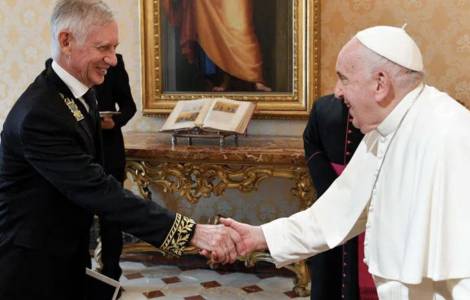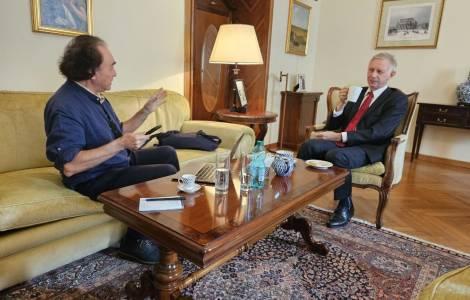
Vatican Media
By Victor Gaetan*
Rome (Agenzia Fides) - Ambassador Ivan Soltanovsky presented his credentials to Pope Francis on September 18, 2023 as the third ambassador to the Holy See from the Russian Federation. He also represents Russia to the Sovereign Order of Malta.
During their historic meeting in 1989, Saint John Paul II and the Soviet Union's President Mikhail Gorbachev announced the establishment of diplomatic relations between Moscow and the Vatican and the first envoys were exchanged in 1990. Seven Russian envoys have served at the Holy See since. (Pope Benedict XVI and Russia’s President Vladimir Putin established full diplomatic relations between the two Countries in December 2009.)
In the following interview, Ambassador Ivan Soltanovsky explains the Russian perspective on relations with the Holy See in the current historical phase.
A career diplomat, Ivan Soltanovsky has specialized in multilateral relations, as a representative to the OSCE (1996-2000), NATO (2003-2009), and served as Russia’s Permanent Representative to the Council of Europe (2015-2022). Victor Gaetan interviewed him about his career and Russia’s relationship with the Holy See in Russia’s embassy on Rome’s Via della Conciliazione, a few steps from St. Peter’s Basilica. In First Interview with Western Journalist, Amb. Ivan Soltanovsky Shares Russian Perspective-
Pope Francis prioritizes personal dialogue with all parties to any conflict. He writes in Evangelii gaudium: “When we live out a spirituality of drawing nearer to others and seeking their welfare, our hearts are opened wide to the Lord’s greatest and most beautiful gifts. Whenever we encounter another person in love, we learn something new about God. Whenever our eyes are opened to acknowledge the other, we grow in the light of faith and knowledge of God.” (para. 272).
How important is Russia’s relationship with the Holy See?
AMBASSADOR IVAN SOLTANOVSKY: Very important. We see the Holy See to be quite an independent actor with global outreach and importance. It is quite advanced in its approach to sensitive issues. It is always engaged in dialogue based on mutual respect.
I read the encyclical Fratelli Tutti and have great respect for it. Pope Francis describes the world as a polyhedron with different facets and each facet has its own value. He is talking about multipolarity. Diversity within harmony. This respect for different civilizations, civilizational identity, is very important. For example, in Russia we consider traditional family values, sometimes attacked, to be fundamental. We believe in these values.
So, this is the conceptual background for our cooperation. It’s important for us to promote dialogue with the Vatican as we find similarities with our vision in the present-day situation.
What did you discuss with Pope Francis when you presented your credentials in September?
SOLTANOVSKY: My conversation with Pope Francis, in accordance with the Holy See Protocol and tradition, was tête-a-tête, without other persons present, except an interpreter. So, I would like to stick to the tradition and share with you only my personal impression of the 15-20 minutes talk: It was open, sincere, and full of respect for each other, with an understanding that we should maintain dialogue on important questions. I was impressed by the Pope’s deep and universal knowledge of contemporary realities.
Your assignment to the Holy See seems quite different from past posts. Is it?
SOLTANOVSKY: Logically, this post is very different but there are some similarities with my assignments to NATO and the Council of Europe. The prior two were multilateral and this is bilateral. But when you think about the global vision of the Vatican, you can compare it to a big international organization. I find interesting similarities, as a professional, trying to build bridges within an international organization.
Regarding NATO, we tried to improve relations with important structures, but unfortunately times have changed drastically. The Vatican has its own face. While with NATO, I don’t know if individual countries have their own face because they speak with one voice and the voice is supposedly international. And this voice is 100% anti-Russian.
With the Vatican, it is absolutely different for me. The long history of Vatican diplomacy is very enriching. Pope Francis today has eyes wide open.
When you served as Russia’s Deputy Permanent Representative to NATO in Brussels between 2003 and 2009, were those considered “good years” for relations between Russia and the United States?
SOLTANOVSKY: They were pragmatic and open years for cooperation. I would not use the term “good.” They were certainly better years. Discussions were quite active with the Americans and NATO on the real problems of security. We had a system of communication in different areas. But as we see now, they were not committed to sincere dialogue and serious discussions on the real problems of security. The idea of providing equal security for all, not only for NATO members, remained alien to them.
As far as the US is concerned, I personally did not have direct discussions with them. I worked on different topics, including peaceful cooperation in space. The international space station was an excellent example of cooperation with NASA. But I do not idealize that time at all. The American establishment never fully understood the experience of Russia of the early 1990s, that was unfortunate and tragic in many ways.
In the early 1990s, Russia was treated as a vanquished country by the West. In contrast, the Vatican tradition of diplomacy teaches that to promote reconciliation, never create a sense of winners versus losers. There’s a lot of evidence that the Soviet system was undone from within because much of the Communist system was brought about by a foreign ideology. What is the truth? Did the West “win” or did the political system change from within, in order to restore Russian identity?
SOLTANOVSKY: You have both a philosophical and political question. Western leaders deceived our leaders with, “Don’t worry about us expanding NATO frontiers close to Russia, and even to countries bordering Russia”. It was a mistake not to have a legally binding agreement that would exclude any possibility of this security risk for my country. The Moscow leaders were too idealistic in believing the words of their Western counterparts.
We had many good things in the Soviet Union such as excellent preschool and a social welfare system but negative things too. Perestroika was at the time supported by the majority of people. We had foreign pressure and internal problems. Ultimately, there was tragedy for the whole country because there was a lot of economic suffering. So, the country had to reestablish itself despite many mistakes and many losses.
A certain philosophical transformation emerged at the beginning of the 2000s. The West tried to impose conditions. In those years we had direct dialogue with the West but, we believe we were perceived as weak, and they tried to impose certain conditions. Although not perfect times, at least we discussed things.
Where were you on Christmas 1991, when President Mikhail Gorbachev resigned, and the Soviet Union ceased to exist?
SOLTANOVSKY: I was in India. This was a sad event, well, mostly sad when you see your national flag taken down. Yet, the sight of the historical Russian [Tzarist] tricolor was very powerful because it meant the reinstatement of Russia’s heritage. At that time, we had hope, because we hoped the new leaders would hold the reins, but destructive forces took over, especially in the economy.
We were faced with this question: How to stabilize our country. How to reestablish self-respect in the face of economic collapse.
From what you observed in Brussels, how much leverage did the NATO Secretary General have?
SOLTANOVSKY: It depends on the personality. They are, in my humble understanding, technocrats. Policy managers. Generally, I don't recall, nor did my colleagues, that, well, the secretary general of NATO is someone of the caliber of De Gaulle or Giulio Andreotti or Helmut Kohl for whom we have high esteem. We participated not for confrontation but for peaceful talk.
Today’s Western leaders, with very rare exceptions, tend to demonize Russia and the Russian people, and that’s crazy.
Because you specialized in Pakistan and Afghanistan, I wonder: Zbig Brzezinski said the U.S. intentionally trapped the Soviet Union by luring the country into Afghanistan. How does a Russian diplomat respond to that?
SOLTANOVSKY: It was a mistake. The Afghan experience was painful, but we were responding to the security challenges to our country, at least as they were perceived by political leaders of the USSR at that time. Now it seems to have been a mistake.
During your time working with the Council of Europe, what were good or great encounters?
SOLTANOVSKY: I had good relations with many counterparts. Before 2008, you couldn't think about Europe without considering Russia. You can’t erase Russia from the map.
Switching to a more personal question, are you a member of a Church?
SOLTANOVSKY: I am on the way to being a true believer. I go to church in Rome, but not to a particular church.
When did you begin the process of getting on the way to belief?
SOLTANOVSKY: I can’t tell you the exact day, if one wants to be sincere, and I'm trying to be sincere because to be a true believer one needs to go through many things and not just to visit occasionally. For me, it was because every human needs a relation to God. For me it means praying for the well-being of family, parents, and friends. For me, it all began about five years ago.
Then I started preparations for my assignment in Rome and being here certainly stimulates going deeper into the fabric of faith, understanding the dogma of belief.
Victor Gaetan is a senior correspondent for the National Catholic Register, focusing on international issues. He also writes for Foreign Affairs magazine and contributed to Catholic News Service. The Catholic Press Association of North America has given his articles four first place awards, including Individual Excellence. Gaetan received a license (B.A.) in Ottoman and Byzantine Studies from Sorbonne University in Paris, an M.A. from the Fletcher School of International Law and Diplomacy, and a Ph.D. in Ideology in Literature from Tufts University. His book God’s Diplomats: Pope Francis, Vatican Diplomacy, and America’s Armageddon (Rowman & Littlefield, 2021) comes out in paperback in July. Visit his website at VictorGaetan.org
(Agenzia Fides, 14/12/2023)

 AFRICA/MALI - Tinzaouaten massacre: military government breaks off diplomatic relations with Ukraine
AFRICA/MALI - Tinzaouaten massacre: military government breaks off diplomatic relations with Ukraine